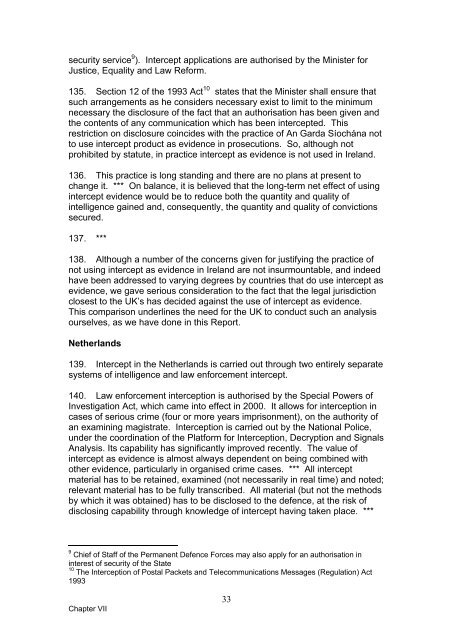Privy Council Review of intercept as evidence: report - Official ...
Privy Council Review of intercept as evidence: report - Official ...
Privy Council Review of intercept as evidence: report - Official ...
Create successful ePaper yourself
Turn your PDF publications into a flip-book with our unique Google optimized e-Paper software.
security service 9 ). Intercept applications are authorised by the Minister for<br />
Justice, Equality and Law Reform.<br />
135. Section 12 <strong>of</strong> the 1993 Act 10 states that the Minister shall ensure that<br />
such arrangements <strong>as</strong> he considers necessary exist to limit to the minimum<br />
necessary the disclosure <strong>of</strong> the fact that an authorisation h<strong>as</strong> been given and<br />
the contents <strong>of</strong> any communication which h<strong>as</strong> been <strong>intercept</strong>ed. This<br />
restriction on disclosure coincides with the practice <strong>of</strong> An Garda Síochána not<br />
to use <strong>intercept</strong> product <strong>as</strong> <strong>evidence</strong> in prosecutions. So, although not<br />
prohibited by statute, in practice <strong>intercept</strong> <strong>as</strong> <strong>evidence</strong> is not used in Ireland.<br />
136. This practice is long standing and there are no plans at present to<br />
change it. *** On balance, it is believed that the long-term net effect <strong>of</strong> using<br />
<strong>intercept</strong> <strong>evidence</strong> would be to reduce both the quantity and quality <strong>of</strong><br />
intelligence gained and, consequently, the quantity and quality <strong>of</strong> convictions<br />
secured.<br />
137. ***<br />
138. Although a number <strong>of</strong> the concerns given for justifying the practice <strong>of</strong><br />
not using <strong>intercept</strong> <strong>as</strong> <strong>evidence</strong> in Ireland are not insurmountable, and indeed<br />
have been addressed to varying degrees by countries that do use <strong>intercept</strong> <strong>as</strong><br />
<strong>evidence</strong>, we gave serious consideration to the fact that the legal jurisdiction<br />
closest to the UK’s h<strong>as</strong> decided against the use <strong>of</strong> <strong>intercept</strong> <strong>as</strong> <strong>evidence</strong>.<br />
This comparison underlines the need for the UK to conduct such an analysis<br />
ourselves, <strong>as</strong> we have done in this Report.<br />
Netherlands<br />
139. Intercept in the Netherlands is carried out through two entirely separate<br />
systems <strong>of</strong> intelligence and law enforcement <strong>intercept</strong>.<br />
140. Law enforcement <strong>intercept</strong>ion is authorised by the Special Powers <strong>of</strong><br />
Investigation Act, which came into effect in 2000. It allows for <strong>intercept</strong>ion in<br />
c<strong>as</strong>es <strong>of</strong> serious crime (four or more years imprisonment), on the authority <strong>of</strong><br />
an examining magistrate. Interception is carried out by the National Police,<br />
under the coordination <strong>of</strong> the Platform for Interception, Decryption and Signals<br />
Analysis. Its capability h<strong>as</strong> significantly improved recently. The value <strong>of</strong><br />
<strong>intercept</strong> <strong>as</strong> <strong>evidence</strong> is almost always dependent on being combined with<br />
other <strong>evidence</strong>, particularly in organised crime c<strong>as</strong>es. *** All <strong>intercept</strong><br />
material h<strong>as</strong> to be retained, examined (not necessarily in real time) and noted;<br />
relevant material h<strong>as</strong> to be fully transcribed. All material (but not the methods<br />
by which it w<strong>as</strong> obtained) h<strong>as</strong> to be disclosed to the defence, at the risk <strong>of</strong><br />
disclosing capability through knowledge <strong>of</strong> <strong>intercept</strong> having taken place. ***<br />
9 Chief <strong>of</strong> Staff <strong>of</strong> the Permanent Defence Forces may also apply for an authorisation in<br />
interest <strong>of</strong> security <strong>of</strong> the State<br />
10 The Interception <strong>of</strong> Postal Packets and Telecommunications Messages (Regulation) Act<br />
1993<br />
Chapter VII<br />
33
















